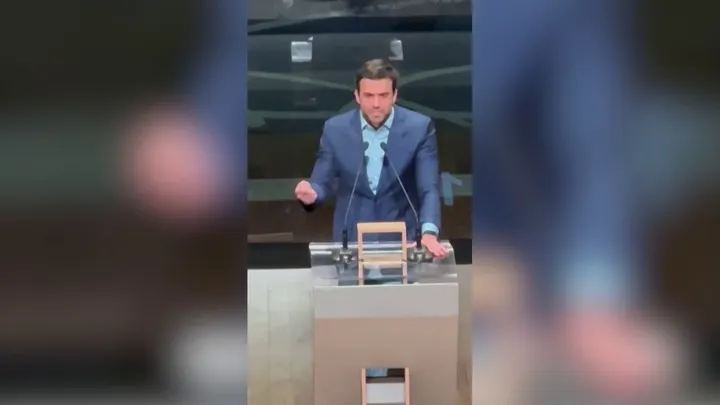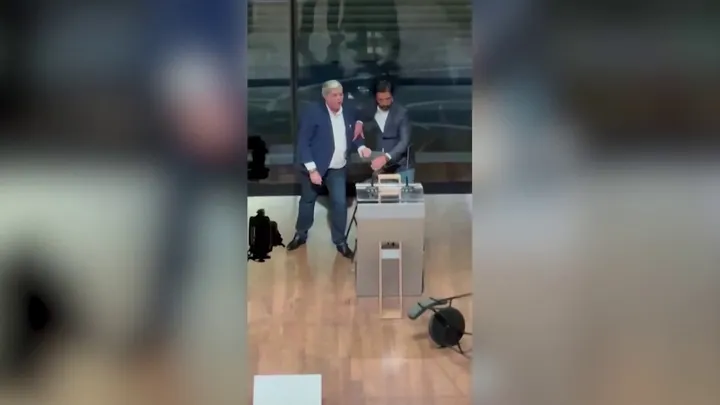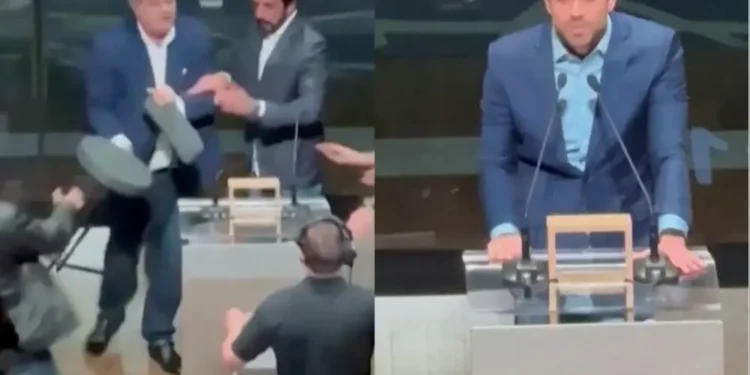Brazilian Politician’s
A recent mayoral debate in Brazil escalated into violence when a candidate assaulted his opponent during a live broadcast, startling viewers and political commentators. This incident took place in São Paulo, the largest city in Latin America, as Pablo Marçal, a right-wing self-help coach, gained significant traction in the polls thanks to his confrontational and often divisive campaign strategies.
Marçal, recognized for his bold demeanor and incisive critiques, had been unsettling his rivals, José Luiz Datena, a former television journalist with more moderate views. During the debate, Marçal confronted Datena about past sexual harassment allegations that had ultimately been dismissed, leading to a quickly escalating confrontation.
“You approached the debate stage just to hit me,” Marçal provoked Datena, referencing a prior confrontation. “You’re not even brave enough to face me.” This exchange culminated in an unanticipated episode of violence. In a shocking moment caught on camera, Datena grabbed an iron chair and swung it at Marçal’s back, an act that not only dominated news headlines but also marked a pivotal moment in the election, illustrating an unprecedented level of aggression in Brazilian politics.
Immediate Aftermath: Hospitalization and Social Media Buzz
In the immediate aftermath of the chair attack, the network interrupted the debate for a commercial break. Marçal was transported to a hospital, and images quickly spread across social media showing him on a stretcher with an oxygen mask, followed by a later appearance in a hospital gown with his arm in a sling. Hospital officials initially refrained from providing detailed information about his injuries, but Marçal’s team asserted that he might have sustained a broken rib and experienced breathing difficulties. Subsequent hospital reports confirmed “trauma to the right chest area and right wrist without major complications.”
Taking swift advantage of the situation, Marçal shared dramatic footage online, casting himself as a victim of a political assault. He drew parallels between this incident and other high-profile violent political events, including the attempted assassination of former U.S. President Donald Trump in July and the stabbing of former Brazilian President Jair Bolsonaro in 2018. In one of his posts, Marçal questioned, “Why all the animosity?” further reinforcing his narrative of being targeted by severe political hostility.
Despite the dramatic events and claims of injury, Marçal was discharged from the hospital relatively quickly, downplaying his condition by calling it merely a “bump.” Nevertheless, his campaign utilized the incident to file a police report against Datena, labeling the assault as an “attempted murder.”
Context: The Volatile Political Landscape of São Paulo
This incident arises amid a crucial phase in São Paulo’s mayoral campaign, a time characterized by heightened tensions and large stakes. Marçal’s surge in popularity has disrupted the dynamics of the race for leadership in the sprawling metropolis of over 11.5 million residents. His populist style, often echoing the rhetoric of figures like Donald Trump and Jair Bolsonaro, has resonated with certain voter demographics. Current polls indicate that Marçal is in a competitive three-way tie for the lead against the current right-wing mayor, Ricardo Nunes (supported by Bolsonaro), and leftist congressman Guilherme Boulos (backed by President Luiz Inácio Lula da Silva).

A mayoral candidate in Sao Paulo, Brazil was attacked by one of his opponents with a metal chair during a televised debate over the weekend. (SITE TV POP via Reuters)Brazilian Politician’s
Meanwhile, Datena, once thought to be a strong candidate due to his extensive background as a crime reporter and television figure, now finds himself lagging in the polls, supported by merely 7% of voters. His struggle to remain relevant in a contest dominated by high-profile and divisive figures, such as Marçal, may have partially prompted his outburst during the debate, though this does not justify his actions.
In his post-incident comments, Datena acknowledged that he “lost his composure,” though he stopped short of apologizing, asserting that he does not regret his actions. “I made a mistake, but there’s no regret,” he stated, maintaining that Marçal provoked him and framing the attack as a reaction to Marçal’s ongoing verbal attacks and “history of aggression.”
Datena’s Rationale and Repercussions
Datena justified his violent reaction by expressing frustration over Marçal’s mention of past sexual harassment allegations during the debate. Even though these accusations were investigated and dismissed years ago, their reemergence during a heated political confrontation affected him deeply. “He raised an old case that was never even investigated by the police due to lack of evidence, something from 11 years ago that caused a very serious situation within my family,” Datena explained.

A mayoral candidate in Sao Paulo, Brazil was attacked by one of his opponents with a metal chair during a televised debate over the weekend. (SITE TV POP via Reuters) Brazilian Politician’s Mayoral Debate Turns Violent: Candidate Assaulted with Chair on Live Broadcast
He also contended that the stress from this public incident might have contributed to personal tragedies, claiming it was a factor in his mother-in-law’s strokes and subsequent passing. However, public and media responses have been varied. While some empathize with his emotional strain, others deem his violent reaction as unprofessional and detrimental to his campaign.
Marçal’s Strategy: Victimhood and Campaign Momentum
Marçal has adeptly maneuvered through the repercussions of the incident, casting himself as a victim of political violence. His immediate response on social media, which included footage of his hospital visit and comparisons to other instances of political violence, attracted considerable attention. This handling of the situation has kept him prominently in the media spotlight, potentially benefiting his campaign by portraying him as a determined figure capable of confronting aggression.
In response to a question on social media about whether the incident was worth it for his mayoral aspirations, Marçal confidently stated, “It will be worth it.” This assertion, paired with his energetic social media engagement, has enhanced his standing among supporters. By associating with other politicians who have experienced violence, he taps into a narrative of resilience and victimization that resonates with his right-leaning base.
Consequences for São Paulo’s Mayoral Contest
The chair attack is likely to have important ramifications for the São Paulo mayoral election. Marçal’s increasing popularity and the publicity arising from the assault have amplified his presence in the political sphere. The images and videos from the attack are already circulating widely, shaping public opinion and potentially influencing undecided voters. His characterization of the incident as “attempted murder” aims to position him as a victim of political hostility, a strategy that could further galvanize his support.
Conversely, Datena faces the challenge of overcoming the adverse perceptions stemming from his violent outburst. Despite his efforts to rationalize his behavior and express no regret, public reactions to a politician engaging in physical violence on live television may tarnish his reputation and diminish his already limited support.
In a city characterized by a vibrant yet tumultuous political atmosphere, this incident underscores the intensity and unpredictability of São Paulo’s mayoral race. Drawing international attention, it highlights the charged political climate in Brazil and the extremes to which candidates may resort in their quest for power. The impact of Marçal’s characterization as a victim of political violence on his ability to attract sympathy votes, versus Datena’s defiant stance appealing to certain voter segments, remains uncertain. What is evident, however, is that this episode has significantly altered the narrative of the election and left an indelible mark on Brazil’s political landscape.

























